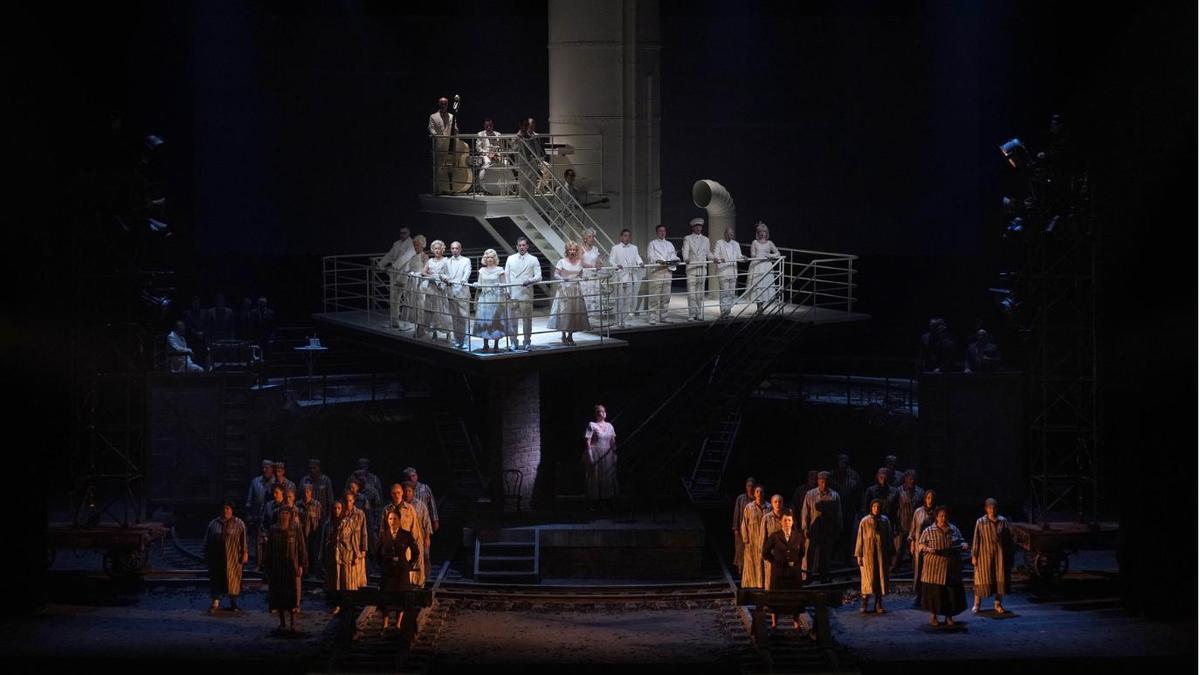Popular wisdom (what a thing) advises against traveling by boat or getting married on Tuesdays. Although the saying doesn’t say it, it seems that it is not very advisable to go on a cruise if you have done some work in Auschwitz.
Anna Lisa Franz, young wife of a German diplomat, is on her way to a Brazilian embassy: a dream destination for any post-war German. But Happiness does not last long in the Nazi’s house: An enigmatic passenger lurks on the transatlantic, whom Lisa believes she recognizes one of the prisoners from the concentration camp where she, deceived by the Führer (there everyone obeyed orders and blah blah blah), did some reprehensible thing. Soponcio, marriage crisis! Being related to an SS frustrates any diplomatic career. Honey, tell me everything: we have to do damage control.
This is the mess with which it starts The passengeran opera Mieczysław Weinberg which adapts the novel of the same name by Zofia Posmysz, Holocaust survivor. Weinberg is a strange composer: Polish, he exiled to the Soviet Union and befriended Shostakóvich, due to whose influence he managed to dodge more than one bullet. Although he enjoyed a good reputation among Russian composers, anti-Semitic and anti-formalist persecutions (Stalin detested many things) meant that his fame came to him posthumously. Weinberg died in 1996 in Moscowaged 76, and the opera premiered ten years later, in that same city, in a semi-staged version.
Upper part of the scene from ‘The Passenger’. / Javier del Real | Royal Theatre
The production that we saw last night at the Teatro Real is a adaptation of the proposal that David Pountney made for the Bregenz Festival in 2010. The scene is built around a corpulent fireplace, which serves as the axis for two temporal and spatial levels: on the upper ones, the deck and the ballroom of the ship that crosses the Atlantic. In the lower ones, the horrendous extermination field. This vertical element is complemented by some cars (the reference is somewhat obvious) that move along rails arranged in a circumference and that serve to frame the pertinent locations.
The lower part of the scene represents the Auschwitz concentration camp. / Javier del Real | Royal Theatre
Let’s resume. Lisa tells her very worried husband (“what will they say”, “we’re finished!”) about her adventures in the slaughterhouse. “We did our duty,” says the jailer: “they hated us, Walter, all of us; it was unbearable.” Doesn’t a genocide have the right to a second chance? During the first act, a flash back It takes us to the younger years of our friend, the SS. We are introduced to the officers, concerned with logistics: annihilating the Reich’s enemies is easy, but disposing of the corpses is exhausting. Also to the inmates, a heterogeneous and polyglot group that survives among the brutality of the in the graves and the cruelty of the guards. The score plays a fundamental role in this section of presentations: the jacarando sound of the ship becomes sullen in the field and very weak in the prisoner’s barracks. The inmates overlap their stories, in a choral presentation that culminates with the appearance of Marta, the passenger that Lisa believes she has crossed paths with on deck. Weinberg achieves an ominous and oppressive atmosphere by layering the choruseswho repeat sad little songs like litanies.
In the second act, things get worse. Marta’s fiancé is also in the field. He is a violinist and the Nazis have demanded that he learn the pounding waltz that the commander loves. “He’s a great music lover.” Suddenly, The plot takes a turn and heads down the dangerous path of love in times of the Holocaust.. Transformed into a realistic work (those that tell the misfortunes of the unfortunate people of the earth), the script focuses on the particular drama of each inmate and the ruthless machinations of the jailer, who has found in the love of Tadeusz and Marta another excuse to display her cruelty. . At this point, one begins to get tired of certain scenic tricks: believe me, it is not necessary for the lighting to flash every time a guard appears. Music collaborates: a lot hivesI’m sorry already.
Amanda Majeski (Marta) and Daveda Karanas (Lisa), stars of ‘The Passenger’. / Javier del Real | Royal Theatre
For this moment, the plot has unraveled: In the supposed memories of the SS, sequences appear in which she is neither present nor expected. It also doesn’t add up that the male choir, which sings the “black wall…” psalmody, is dressed “as a spectator” to symbolize the passivity of observers who could have intervened and did not. Anyway, let’s move on: in the concert for the commander, Tadeusz starts with the chaconne of the Match nº 2 of Bach, so the guards finish him off. Marta is sent to death row and, on the cruise, a waiter tells the friendly SS that the disturbing traveler has a British passport, but she is Polish. The doubts seem to be resolved during the captain’s dance: our mysterious protagonist asks the orchestra to play the camp commander’s waltz. Lisa panics and we return to Auschwitz, where Marta, already dressed in civilian clothes, asks that that atrocity not be forgotten. At that moment, inexplicably, the curtain falls.
Regarding the musical section, a couple of final comments. Mirga Gražinytè-Tyla he conducts the orchestra with energy, offering us a uniform reading of a somewhat fragmentary score. Between us, I don’t remember the last time I saw a director in the Real pit. About the singers, Amanda Majeski (Marta) Daveda Karanas (Lisa) and Nikolai Schukoff (Walter) lead an undoubtedly ensemble cast that does an excellent job. After a few hours, I have the impression that The passenger It is a work that deflates as it progresses. Perhaps we already have many works on the Holocaust under our belts. Of course: I can’t get out of my head how strange it is to see a theater applauding some guys dressed as Nazis.
2024-03-02 23:24:23
#Passenger #Teatro #Real #unfair #cancel #Nazis


